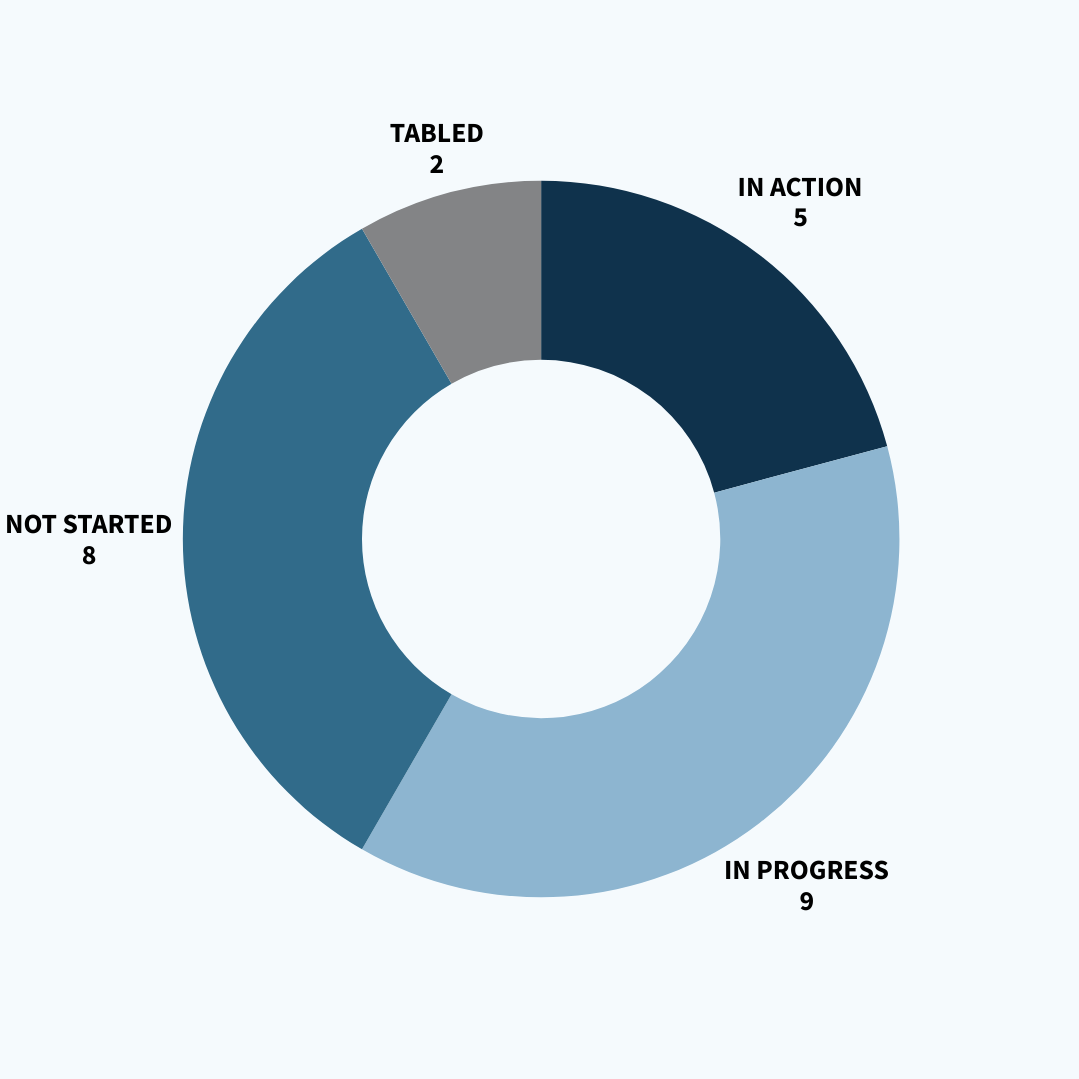South Portland Progress

Buildings & energy
5 IN ACTION
9 in progress
8 not started
2 TABLED
(Updated Dec 2024)

Pursue power purchase agreements (PPAs) to reach 100% renewable energy for city facilities ahead of state renewable portfolio standard (RPS) schedule.
Status: In Progress
Update: Solar arrays at Hamlin Building, South Portland Community Center, capped landfill, and an off-sight project offset close to 80% of municipal electricity usage. (Updated Dec 2024)
Key Milestones: All municipal electricity use met by renewable energy by 2032
Pursue net-zero energy (NZE) buildings for new city government buildings through performance-based procurement.
Status: In Progress
Update: Net Zero Energy Goal (10% more efficiency than IECC 2021 and all-electric) incorporated into Facilities Planning Committee building design scenarios with the aim of using this goal for the next City building construction. (Updated Dec 2024)
Key Milestones: All newly constructed or gut-rehabbed city buildings to be NZE or NZE-ready starting in 2026
Develop a strategic energy management plan (SEMP) for all city facilities and lead by example by pursuing deep energy retrofits and electrification for large existing city buildings.
Status: In Progress
Update: ASHPs and LED lighting being installed in all city buildings; once Facilities Planning Committee work is complete, Facilities Dept will begin to develop plans for electrifying existing buildings – starting with Main Library in 2024 using EECDBG grant funding. (Updated Dec 2024)
Key Milestones: SEMPs commissioned by 2025; deep energy retrofits underway by 2026; all retrofits to be net zero energy completed by 2030
Create either a shadow carbon price for evaluating all city decisions, and/or an internal carbon charge paid to a central climate emergency fund.
Status: Not Started
Update: None (Updated Dec 2024)
Key Milestones: Municipal shadow carbon price or carbon charge implemented by 2026
Advocate for an advanced energy stretch code with an optional net-zero energy compliance path, and adopt the stretch code once finalized. Advocate for the stretch code to require net-zero energy buildings by 2030.
Status: In Action/Passed
Update: Adopted the Maine Energy Stretch Code with solar-ready and zero energy alternative compliance pathways. (Updated Dec 2024)
Key Milestone: Energy stretch code adopted immediately upon finalization; all new buildings to be net-zero energy starting in 2030
Adopt or advocate for solar-ready and Ev-ready requirements for new construction, followed by renewable energy generation building code requirements.
Status: In Progress
Update: Adopted an EV charging requirement for new/reconstructed parking lots; Energy stretch code for 2024 includes basic electric readiness, such as panel capacity. (Updated Dec 2024)
Key Milestone: EV-ready/solar-ready requirements to be implemented by 2028; on-site solar requirements to be implemented by 2032
Ensure code compliance in all buildings through increased investment in robust code enforcement.
Status: In Progress
Update: FY25 budget includes a new Code Enforcement Officer to build capacity for energy code development, inspections, and zoning administrator. (Updated Dec 2024)
Key Milestone: At least one staff person or consultant hired to review energy models by 2026
Partner with organizations in the building sector to develop and promote platforms for education and leadership in high-performance buildings.
Status: In Progress
Update: Previously held a series of meetings with industry leaders to make efficiency, electrified, and resilient building standard; presently partnering with Portland to host workshops for commercial properties – topics to highlight include energy stretch code, passivhaus design, innovative products, and funding mechanisms. (Updated Dec 2024)
Key Milestone: One or more platforms for high-performance building leadership and education launched by 2024
Expand Portland and South Portland’s energy benchmarking programs, and couple with outreach programs to turn energy savings opportunities into action.
Status: Tabled/Repealed by City Council
Update: Benchmarking Ordinance adopted in 2017, updated in 2021, and repealed in 2024. (Updated Dec 2024)
Key Milestone: 80%+ compliance achieved within 2 years of utility data access challenged resolved, ideally by 2025
Incorporate tune-up or performance standards into the Cities’ benchmarking programs for large buildings to achieve carbon savings, and strengthen coordinated job-training programs to support building retrofits.
Status: In Progress
Update: Next steps are to develop a building tune-up program for existing commercial buildings. (Updated Dec 2024)
Key Milestone: Performance standards identified within 2 years of fully implemented benchmarking with requirements adopted in following year
Expand statewide and local energy efficiency spending; advocate for changes in Efficiency Maine spending that remove barriers for fuel switching.
Status: In Action
Update: Advocated for several state-level bills to increase funding for energy efficiency and renewable energy (C-PACE, Green Bank, Efficiency Maine funding); proposing adoption of C-PACE in 2024. (Updated Dec 2024)
Key Milestone: By 2025, Efficiency Maine spending is equivalent to 5% of total electric sales and 2% of residential natural gas sales
Launch a program to shift single family homes and larger multifamily and commercial buildings from fuel oil directly to all-electric heating and cooling.
Status: In Progress
Update: Electrify Everything program issued $262k in rebates in 2022/23 for air source and hot water heat pumps, weatherization, EVs, e-bikes, and lawncare equipment; exploring an Energy Navigators program in 2025. (Updated Dec 2024)
Key Milestone: Electrification incentive program launched by 2023; Replace 80% of natural gas and heating oil use in residences with electric HVAC systems by 2050
Launch bulk buy programs for solar power and heat pumps, paired with electric vehicles as appropriate.
Status: Not Started
Update: None (Updated Dec 2024).
Key Milestone: Bulk buy program launched by 2023.
Continue to enhance the attractiveness of solar through a solar proliferation strategy, as well as offering financial and/or structural incentives.
Status: In Progress
Update: Solar analysis completed; developing a solar proliferation strategy in concert with the state’s “solar for all” program. (Updated Dec 2024)
Key Milestone: Solar proliferation strategy launched by 2023; 50 MW of solar installed in the cities by 2030 and 245 MW of solar installed by 2050
Require minimum energy efficiency standards for residential rental properties to decrease energy use, increase thermal comfort, and reduce energy costs paid by renters.
Status: Not Started
Update: None (Updated Dec 2024)
Key Milestone: Determination of whether to proceed with a rental minimum energy efficiency program by 2026
Advocate for expanded energy efficiency incentives for large industrial users.
Status: Not Started
Update: None (Updated Dec 2024)
Key Milestone: Automatic industrial opt-out provision removed by 2028
Advocate for a statewide study on energy efficiency and decarbonization opportunities in the industrial sector to better target industrial combined heat and power, heat recovery, and renewable fuel oil or biogas.
Status: Not started
Update: None (Updated Dec 2024)
Key Milestone: Industrial efficiency decarbonization study completed by 2025
Continue to advocate for full, timely, and cost-effective implementation of Maine’s renewable portfolio standard; in case it becomes necessary, advocate for municipal authority to bulk procure renewable power on behalf of residents, businesses, and municipal users.
Status: In Action
Update: RPS bill passed; continues to be on track. (Updated Dec 2024)
Key Milestone: Electricity to be 80% renewable by 2030 and 100% renewable by 2050
Reform data access by pursuing legislation that would require utilities to disclose data with building owners and municipalities.
Status: In Progress
Update: Still working with CMP to build platform that provides aggregated whole building data. (Updated Dec 2024)
Key Milestone: Access to whole building and citywide data by 2024; access to automated data connection by 2024
Advocate for regulatory reforms to support statewide electrification and the integration of distributed energy resources.
Status: In Progress
Update: Participating in statewide discussions through the Maine Energy Working Group; tracking policy updates on rate design, DER strategy, and grid planning. (Updated Dec 2024)
Key Milestone: Continue to build on 2020 legislative initiatives
Identify opportunities and encourage the development of fully electric low temperature thermal district energy systems for new and existing developments and campuses.
Status: Not Started
Update: None (Updated Dec 2024)
Key Milestone: All new development over 50,000 square feet to evaluate district energy/ microgrids starting within one year of microgrid enabling legislation.
Improve the efficiency and capacity of transmission and distribution networks to improve electricity supply to Portland and South Portland.
Status: In Progress
Update: Waiting for CMP’s grid modernization plan and non-wires alternative (NWA) docket at the public utility commission (PUC). (Updated Dec 2024)
Key Milestone: Hosting capacity study launched by 2025
Advocate for a state-level ban on new intrastate natural pipelines and any state support for interstate gas pipelines, and advocate for allowing local jurisdictions to limit new and expanded natural gas connections.
Status: Not Started
Update: None (Updated Dec 2024)
Key Milestone: A just plan for transitioning to clean heating developed by 2025; statewide restrictions on new interstate and intrastate gas pipelines in place by 2030, along with defined timeframes for phasing out natural gas
Continue to advocate for carbon pricing at national, regional, and statewide scales.
Status: Not Started
Update: None (Updated Dec 2024)
Key Milestone: Price on carbon as soon as feasible at national, regional, or statewide scale


